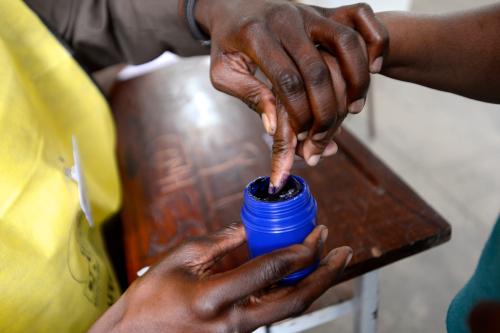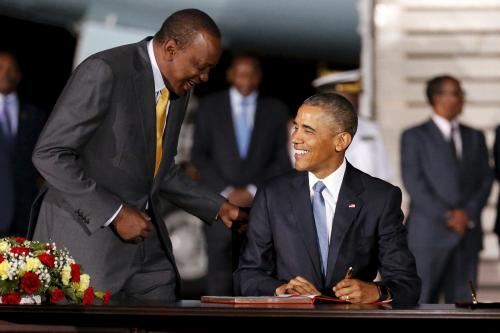Tunisia and Mozambique vote: On Sunday, October 13, Tunisians participated in their run-off presidential elections between conservative former law professor Kais Saied and media magnate Nabil Karoui. Saied, known as “Robocop” for his serious presentation, won with 72.7 percent of the vote. Notably, Saied himself does not belong to a party, but is supported by the moderate Islamist party Ennahdha, which won the parliamentary elections earlier this month. Saied supports decentralization of the government—shifting power to local leaders—and leans conservative, as he favors reinstating the death penalty and opposes equal inheritance between men and women. The youth vote seems to be what propelled Saied to victory: Around 90 percent of voters between 18 and 25 years of age chose to support him. Though the election was nonviolent, it was met with controversy: Notably, not long before the vote, Karoui was arrested the election on corruption charges.
While Tunisia’s elections went smoothly, Mozambique’s Tuesday elections were fraught with tension as sitting President Filipe Nyusi and his ruling party, Frelimo, attempt to hold off former rebel group Renamo. Renamo, now a political party, fought Frelimo in a civil war between 1975-1992, and violence resurged between 2013 and 2016. As of Friday afternoon, the winner of the presidential election had not yet been announced. While Frelimo is expected to win the general election, experts predict that Renamo will see victories in regional and local polls.
According to al-Jazeera, the European Union observer mission “raised the alarm on Thursday over unfair conditions and unjustified use of state resources by the ruling party, as well as widespread violence.” Already, claims of vote rigging have surfaced, and the campaign season did see violence, as the Centre for Public Integrity, a local nongovernmental organization, states that 44 people were killed during the campaign season, mostly in traffic accidents and some in a stampede at a pro-Nyusi rally, but seven were murdered.
Nigeria closes land borders indefinitely
On Monday, October 14, Nigeria’s customs agency confirmed that it had closed its land borders indefinitely in an effort to reduce smuggling and spur the domestic agriculture industry. The announcement was Nigeria’s first official confirmation of a full border closure, but the country’s land borders have been partially closed since August, after Nigerian President Muhammadu Buhari declared the time had come to end rampant smuggling.
The closure has had a severe effect on neighboring Benin, which is a key exporter of food products to Nigeria, and whose farmers are now struggling to sell their produce. Within Nigeria, it has also increased prices for goods such as rice, tomatoes, and sugar, and has increased inflation rates. The closure has had no impact on Nigeria’s economically crucial oil exports, which are primarily shipped by sea.
Nigeria’s border closure is in defiance of its commercial and freedom of movement treaties signed under the Economic Community of West Africa States (ECOWAS). The closure also stands opposed to the African Continental Free Trade Area (AfCFTA) agreement, which Nigeria signed in July and under which countries are set to commence trading on July 1, 2020. Many regional leaders are advising Nigeria to reverse course: For example, Ghana’s minister of foreign affairs and regional integration urged Nigeria to review its decision to close land borders, stating that the closure has severely affected Ghanaian traders and could lead to political tension among impacted countries.
Kenya opens new railway, and President Kenyatta pushes back on new finance bill over rate caps
This week, Kenya operationalized a new railway line linking the capital, Nairobi, to the Rift Valley. The project cost $1.5 billion and was financed by China. The new line will connect with the Chinese-backed Nairobi-Mombasa railway that was opened in 2017, also part of China’s “One Belt, One Road” initiative. In the next phase, Kenya plans to extend the standard gauge railway to the Ugandan border but has run up against funding challenges, as China refused additional funding earlier this year. Addressing the funding challenges at the launch, president Uhuru Kenyatta, reaffirmed his commitment to the project, saying, “There will be challenges along the way but that does not mean we will not do it.”
In other news, the President Uhuru Kenyatta refused to approve the finance bill as part of the 2019 budget because lawmakers failed to repeal the rate-cap law. The 2016 law caps commercial lending rates banks can charge at 4 percentage points above the central bank’s benchmark rate, which is currently 9 percent. Explaining his decision, the president noted, “The capping of interest rates has not addressed the intended objective particularly in expanding credit access.” The cap has reduced private sector lending by banks as many low-income borrowers are deemed too risky. In fact, a study by Kenya’s central bank found that the interest rate cap lowered growth by 0.4 percentage points in 2017.






Commentary
Africa in the news: Tunisia and Mozambique vote, Nigeria closes borders, and Kenya opens new railway
October 19, 2019